While orchids are not typically a threat, recognizing and reacting promptly to any orchid poisoning symptoms in cats is a crucial aspect of responsible pet care.
For those who share their hearts and homes with felines, the pertinent question “Are orchids poisonous to cats?” threads a crucial concern for pet care and feline safety.
The allure of orchids in our living spaces poses the query of orchid toxicity in cats, pressing pet owners to seek a harmonious balance between botanical beauty and cat health.
Luckily, reliable sources such as the American Society for the Prevention of Cruelty to Animals (ASPCA) offer us a sign of relief, that orchids are not considered toxic to our whiskered companions.
Key Takeaways
- Orchids are non-toxic to cats according to ASPCA, offering peace of mind to pet owners.
- Despite their safety, orchids can still cause mild gastrointestinal reactions if ingested by cats.
- Keeping orchids out of cats’ reach and using cat-friendly plant products is vital.
- Knowing which species and chemicals are safe around cats ensures a pet-safe home.
- Being informed as a pet owner protects both your feline’s health and your orchid investment.
Introduction to Orchids and Feline Safety
As an orchid enthusiast and cat owner, I find myself in a beautiful world where the allure of over 25,000 orchid species coexists with the curiosity of our feline companions.
The prolific range of orchids, luscious and vibrant, adds a unique charm to any living space, while my cat’s playful nature brings life into my home.
It’s my responsibility to ensure the safety of my pet, which involves understanding the dangers of orchids for cats, familiarizing with orchid care for pet owners, and being aware of the toxicity of orchids to cats.
In this pursuit of cohabitation, I am committed to educating fellow pet parents on creating a harmonious environment where the beauty of orchids and the well-being of cats are given equal priority.
Concern often arises about the potential hazards our beloved botanical treasures could pose to curious cats.
I’ve learned that while these enchanting flowers are generally safe for cats, vigilance is key, especially when it comes to other environmental toxins that may lurk unseen, like garden chemicals.
To mitigate these risks, I’ve adopted certain practices that allow me to enjoy my passion for orchids without compromising my cat’s health.
- Identification of non-toxic orchid species safe for household pets.
- Use of pet-friendly pest control solutions for orchid maintenance.
- Educational efforts to spread awareness on signs of possible plant ingestion by pets.
In summary, the journey as a doting pet owner who admires the splendor of orchids can indeed be rewarding, given the right precautions are in place.
My mission here is simple: to inform and empower you to make the best choices for your feline friends amongst a sea of orchids, avoiding any missteps in both plant care and pet safety.
Understanding Orchid Toxicity to Cats
As a pet owner who treasures both the aesthetic charm of orchids and the well-being of my furry companion, it is crucial to tackle the myths surrounding orchid toxicity in cats.
It’s not uncommon to encounter concerns regarding whether are orchids poisonous to cats, but let’s explore the reality behind this notion.
Common Misconceptions About Orchids and Cats
Contrary to popular belief, not all houseplants pose a threat to our beloved felines.
It’s important to note that within the vast world of flora, many species can coexist safely with pets.
One such example is the orchid, a plant often questioned for its safety around cats.
The Truth About Orchid Toxicity: What Cat Owners Should Know
Dr. Renee Schmid, a Senior Veterinarian Toxicologist, has provided a clear perspective on this issue.
Although orchids, specifically those in the Orchidaceae family, may cause a mild upset stomach if ingested, they certainly do not lead to dire health consequences.
Cat owners can enjoy an array of orchid varieties while maintaining a secure environment for their pets.
Nonetheless, it’s still advisable to keep these plants out of paws’ reach to prevent any digestive discomfort.
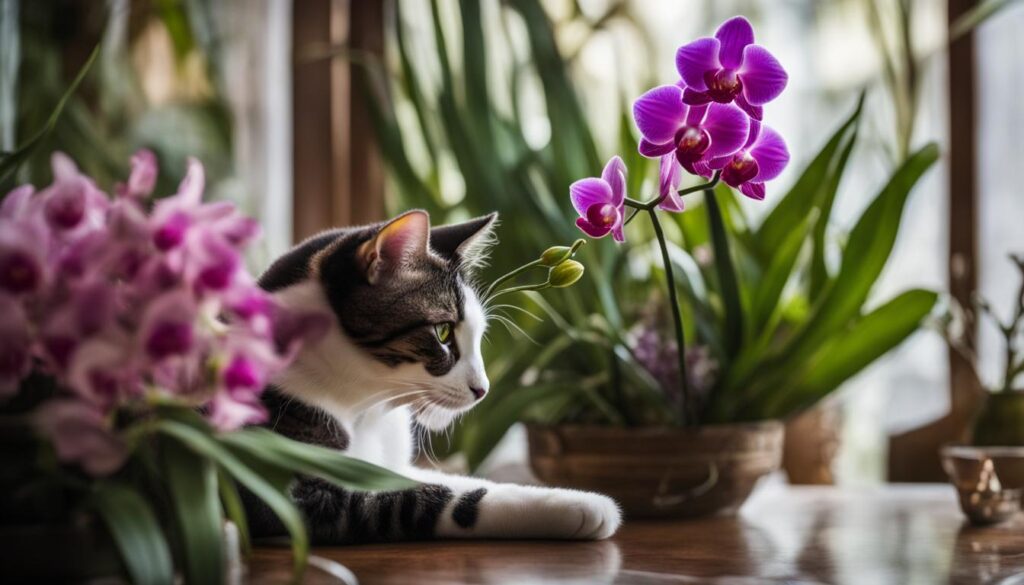
The bottom line is and should echo in the mind of every cat owner, orchids are not a source of severe toxicity.
However, maintaining a vigilant stance is always best for preventing any unplanned visits to the vet due to an upset kitty stomach.
Identifying Safe and Dangerous Orchid Species for Cats
As a cat owner with an affinity for lush, blooming orchids, it’s vital to know which species are safe and which could potentially cause orchid poisoning symptoms in cats.
Understanding which varieties of orchids you can safely bring into your home helps maintain a safe environment for your feline companions.
Safe Orchid Species: Moth, Dendrobium, and More
When it comes to feline safety, several orchid species pose no threat and are considered non-toxic.
The Moth orchid (Phalaenopsis), known for its wide, fluttery flowers, and Dendrobium orchids, with their bright and durable blooms, stand out as popular and safe choices for cat-friendly households.
Owners can be assured that these ornamental beauties, along with Cattleya and Tiger orchids, will not trigger adverse reactions in cats if they happen to nibble on their leaves or flowers.
Dangerous Orchid Species: Cypripedium, Cymbidium, Blue Orchids
While most orchids do not pose a serious threat, some species like Cypripedium, commonly referred to as lady’s slippers, may cause skin irritation in sensitive individuals, and similar symptoms may potentially transfer to cats.
Cymbidium orchids, despite their stunning appearance, could also cause mild gastrointestinal upset if consumed.
Moreover, so-called ‘blue orchids,’ which are typically white orchids dyed blue, may carry additional risks due to the dye’s chemical composition.
Hybrid Orchids and Their Risks to Cats
Hybrid orchids present a unique challenge, as crossbreeding can result in less predictable effects.
The safety of hybrid orchids is not always fully documented, leaving their impact on cats uncertain.
If you’re drawn to the exotic allure of some less common hybrid orchids, exercise caution and prioritize the well-known safe species for the security of your cat.
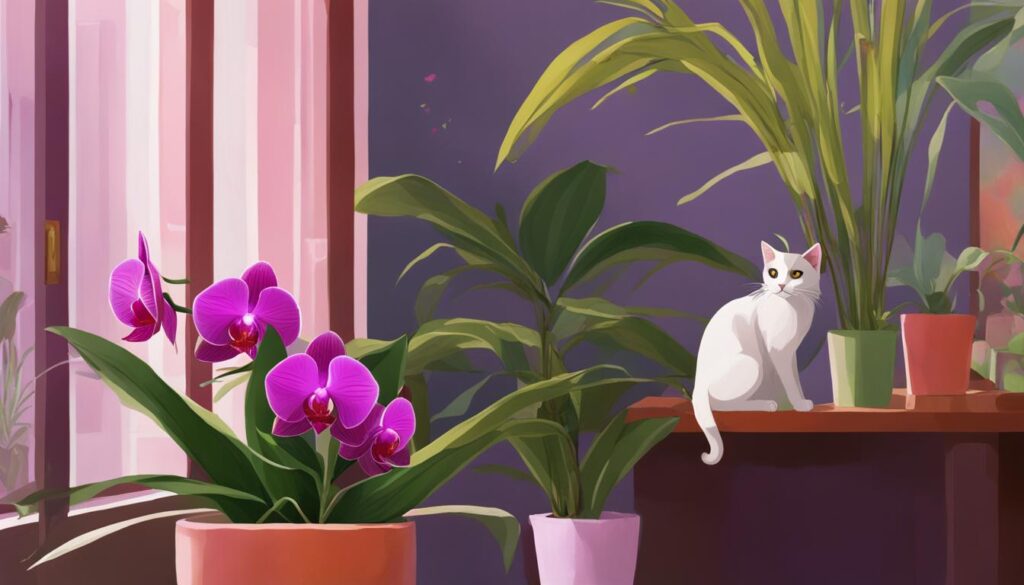
By staying informed about orchid varieties and their potential risks, I can ensure that my floral passion does not compromise my cat’s health.
The peace of mind that comes from providing a secure environment for my pet allows me to enjoy the beauty of orchids without concern.
Remember, when in doubt, consult with a veterinarian or reference comprehensive lists provided by organizations such as ASPCA to ensure every plant in your home is feline-friendly.
Symptoms of Orchid Ingestion in Cats
As cat owners, it’s paramount to stay informed about the orchid toxicity in cats despite their general non-toxicity.
If you’re concerned about whether are orchids poisonous to cats, it’s a relief to know that typical household orchids cause minimal risk.
However, a close watch for orchid poisoning symptoms in cats after ingestion is wise, as even non-toxic plants can lead to discomfort for your pet.
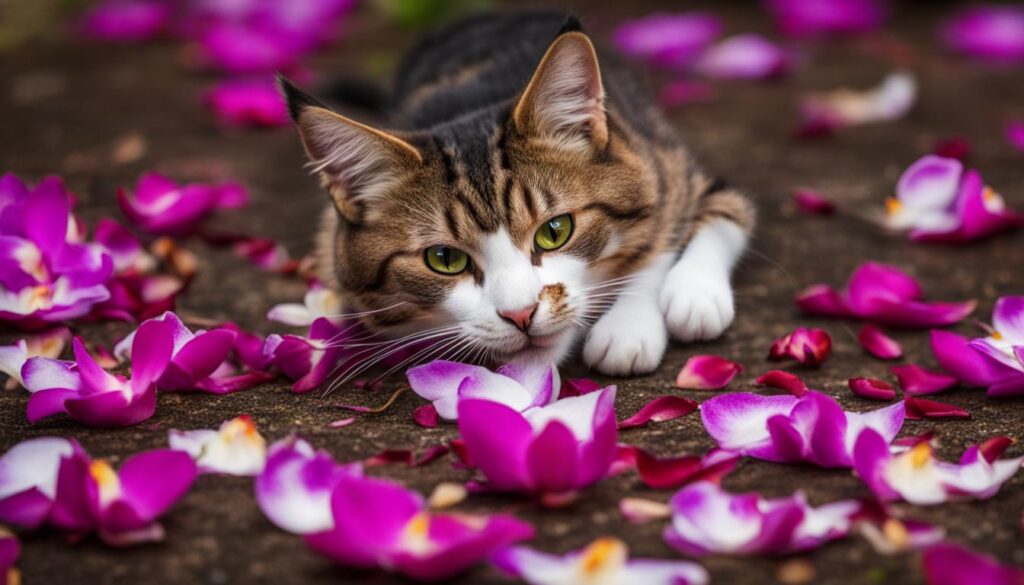
Recognizing and Responding to Plant Poisoning
Initial symptoms can be subtle; you might observe your cat exhibiting signs of gastrointestinal upset such as vomiting or diarrhea.
A decrease in appetite and changes in mood or energy levels could also indicate unease due to orchid ingestion.
For responsible owners, recognizing these discomforts promptly ensures quicker responses and helps maintain your cat’s well-being.
Treatment Options for Orchid Ingestion
In milder cases, close monitoring at home may be sufficient. However, if symptoms persist or worsen, such as a cat presenting with lethargy or experiencing a bowel obstruction, professional veterinary care becomes necessary.
Treatment intensity varies from supportive care to possible hospitalization depending on symptom severity and recovery progression.
| Symptom | Home Care | When to Visit a Vet |
|---|---|---|
| Vomiting | Monitor and ensure hydration | Persistent vomiting for more than 24 hours |
| Diarrhea | Limited diet, watch for dehydration | Self-care ineffective or blood in stool |
| Lethargy | Comfortable environment, minimal stress | No improvement or worsening condition |
| Lack of Appetite | Offer favorite foods, entice with smell | Refusal to eat for over 48 hours |
| Bowel Obstruction | Not applicable – immediate care required | Immediate veterinary intervention |
Preventing Your Cat from Eating Orchids
As a dedicated pet parent, my focus is to ensure that my home is a sanctuary for my feline companions, while still indulging my love for orchid care.
Let’s delve into effective measures that safeguard our curious cats from the potential dangers of nibbling on these beautiful plants.
Strategies to Keep Cats Away from Plants
Minimizing the risk starts with smart plant placement. By elevating orchids out of my cat’s reach using hanging baskets, high shelves, or even dedicated plant rooms, I maintain the charm of a flora-filled environment without worry.
Cats are agile climbers, so I make sure these areas aren’t easily accessible by jumping or climbing.
Training plays a crucial part, too. Redirecting my cat’s attention with toys often works wonders in keeping her focused away from the greenery.
For an extra layer of defense, I sometimes use plant covers or natural deterrents such as citrus peels around the plant’s base, since cats are not fond of these scents.
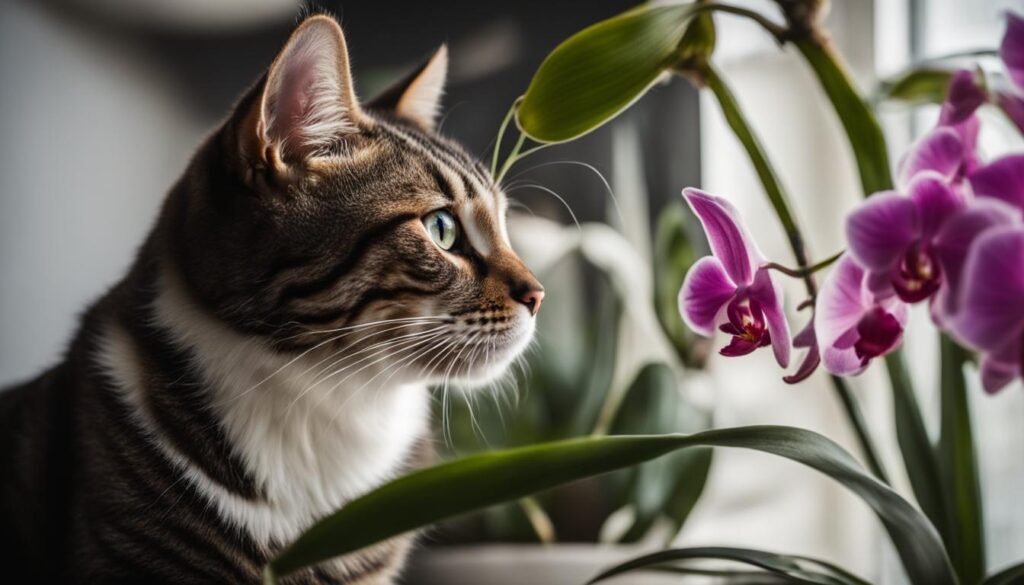
Dog and Cat Safety: Orchid Pesticides, Fertilizers, and Potting Mix
Ensuring the products I use for orchid care are pet-friendly is non-negotiable. Toxic substances in pesticides, fertilizers, and potting mixes can be perilous if ingested by my furry friend.
I always opt for organic or natural alternatives, double-check labels for toxicity warnings, and store hazardous substances in a cat-proof cabinet.
This diligence contributes to a non-toxic environment where my orchids can thrive without posing risks to my pets.
- Use only pet-safe products for orchid maintenance.
- Keep hazardous materials securely locked away.
- Regularly check for and remove fallen leaves or debris.
By exercising these preventive steps, I can embrace my passion for horticulture and pet ownership simultaneously, ensuring the well-being of my cats while enjoying the intricate blossoms of orchids.
Are Orchids Poisonous to Cats If They Smell Them?
As a cat owner who treasures both my feline friend and the allure of blooming orchids, concerns about orchid toxicity in cats occasionally cross my mind.
Particularly, whether the fragrance of these elegant plants can affect my cat’s well-being.
I understand fellow cat lovers may share similar trepidations regarding the dangers of orchids for cats.
However, I’m relieved to share that based on extensive research and expert opinions, orchids present no threat to our cats merely by smelling them.
This is due to the hypoallergenic nature of these plants, orchids produce non-airborne pollen, which means their pollen doesn’t typically enter the air and therefore, cannot be inhaled by our furry companions.
Orchids are classified as safe for homes with cats, which means we can comfortably continue to decorate our spaces with these stunning flowers without fearing airborne toxins.
I’ve put together a comparison to illustrate why orchids are a smart choice for households with cats:
| Orchid Feature | Benefit to Cats |
|---|---|
| Non-Airborne Pollen | Minimizes the risk of allergic reactions and respiratory issues |
| Hypoallergenic Properties | Safe for cats with allergies; no scent-induced toxicity |
| Non-Toxicity | No danger if cats sniff or get close to orchids |
Our curious felines can safely sniff and be in close proximity to orchid blooms without the peril of inhaling toxic substances.
It’s one less worry for us as pet parents, allowing us to enjoy the beauty of orchids peacefully.
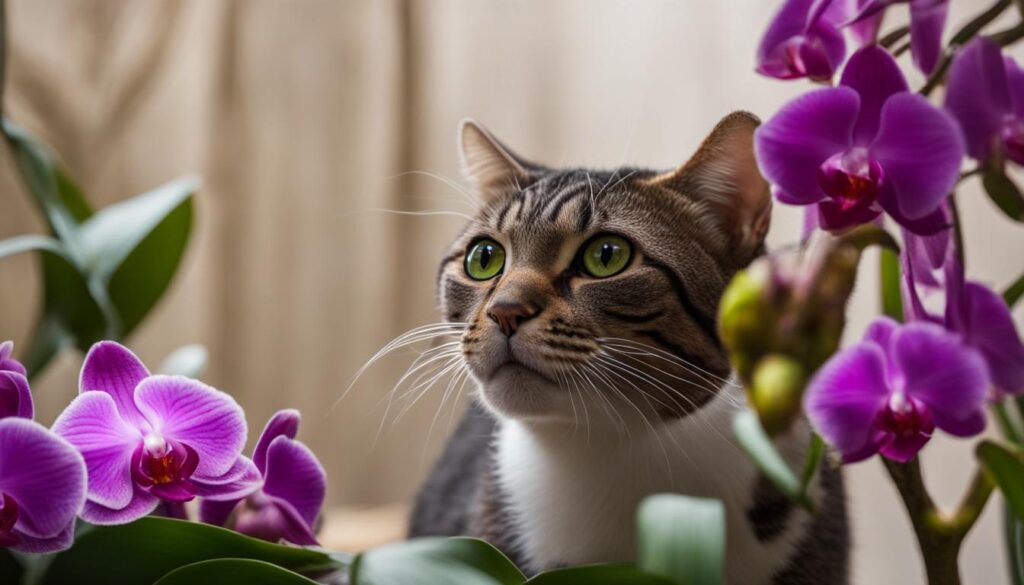
The delicate dance between cultivating a green thumb and caring for a cat doesn’t have to be a complicated one.
By selecting plants like orchids that pose negligible orchid toxicity in cats, we can continue to foster a flourishing, pet-friendly environment at home.
What to Do If Your Cat Eats an Orchid
It’s a common question among cat owners who also love to keep plants: Are orchids poisonous to cats?
The good news is orchids, generally, are not toxic to our feline friends.
Nonetheless, as a proactive pet parent, it’s important to know the steps to take if your kitty takes a fancy to your floral arrangement.
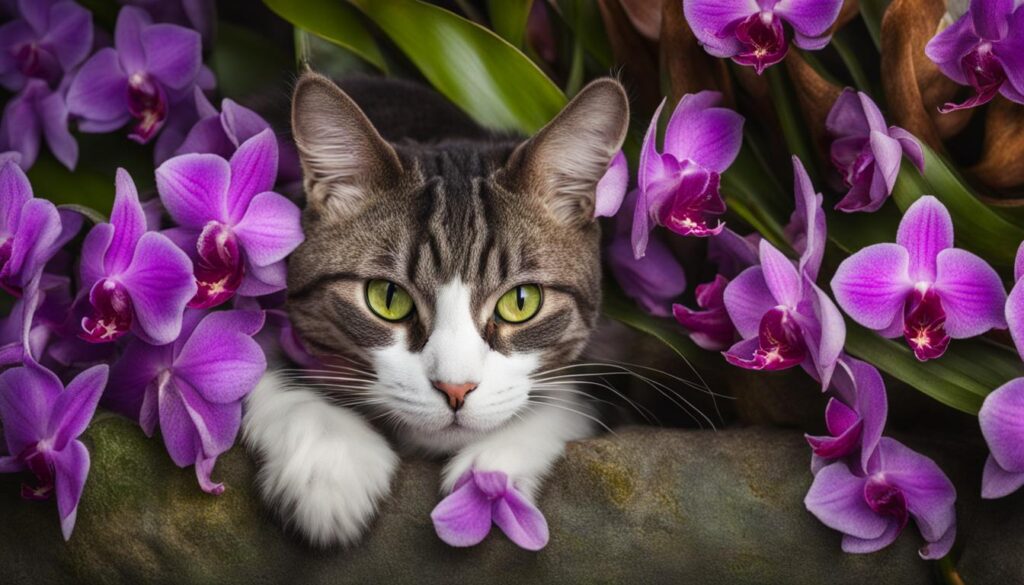
The first move should be to observe your cat closely. A nibble on an orchid may lead to mild orchid poisoning symptoms in cats such as vomiting or diarrhea.
These are not necessarily signs of a severe reaction but are cues to keep a vigilant watch for any escalation.
Immediate Steps and When to See a Vet
If your cat displays only mild discomfort after eating an orchid, monitor their behavior and ensure they have access to plenty of fresh water.
However, it’s crucial to take action if the symptoms persist or worsen.
Lethargy, continuous vomiting, or diarrhea are indicators that it is time to consult your veterinarian.
In uncertain situations, such as when you are unsure about the amount of orchid your cat consumes, do not hesitate to reach out to a professional.
Rapid response is key, and veterinary experts can offer specific advice, possibly averting more acute issues.
In any case, erring on the side of caution will give you peace of mind and will ensure the health of your beloved pet is not compromised.
While orchids are not typically a threat, recognizing and reacting promptly to any orchid poisoning symptoms in cats is a crucial aspect of responsible pet care.
Common Myths and Why Misinformation Matters
My journey as both an avid horticulturist and a cat owner has revealed the significance of dispelling myths, especially when it comes to the question, are orchids poisonous to cats?
A prevalent fallacy I’ve come across is the notion that these elegant plants present an inherent danger to our feline companions.
Society often clings to such mistaken beliefs, but extensive information from expert sources like the ASPCA has clarified the toxicity of orchids to cats, confirming their non-toxic status.
It’s important to me to convey that misinformation not only causes undue stress but could also strip us of the joys of nurturing orchids.
Utilizing credible expert data, I want to ensure pet owners are well informed. Here’s a closer look at why it’s essential to bust these myths:
- Accurate information preserves the well-being of our pets.
- It enables pet owners to continue cultivating a passion for orchids without fear.
- Cut through misinformation to prevent unnecessary worry.
Allow me to take this moment to reassure you that your cat and your beloved orchids can coexist peacefully.
Your furry friends aren’t at risk if they share a space with orchid varieties from the Orchidaceae family.
Still, it remains wise to monitor any interaction your cat may have with houseplants.
Ultimately, understanding the real toxicity of orchids to cats is essential in fostering a safe environment for our pets, while enhancing our homes with these magnificent flora.
I’m here to put your mind at ease: your orchids can bloom in all their glory without posing a risk to your curious cat.
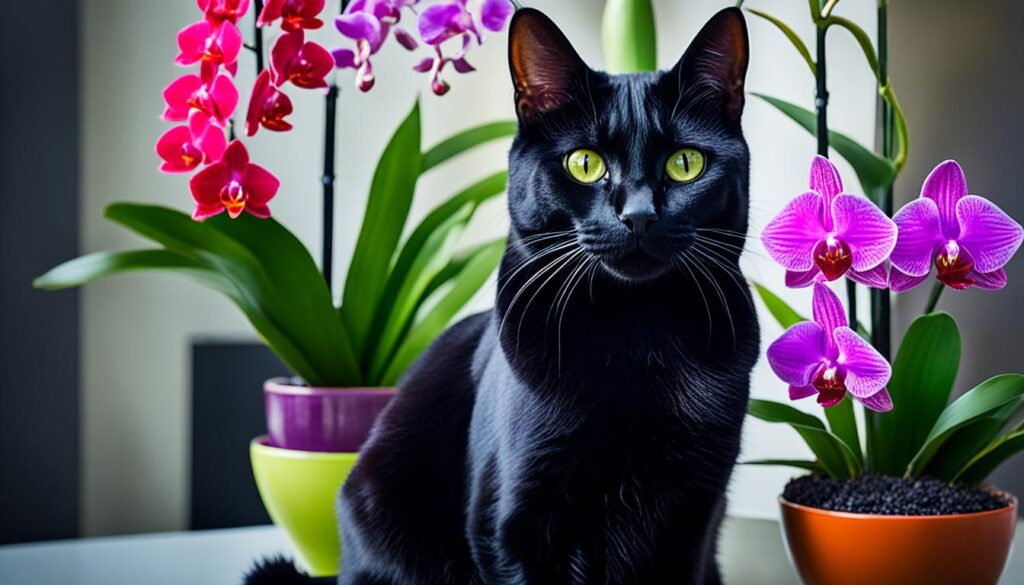
The Bottom Line on Cats and Orchid Safety
As a pet owner who cherishes both the allure of orchids and the company of cats, I understand the importance of ensuring our furry friends’ safety.
It’s a relief to share that, indeed, orchids are not poisonous to cats. This affirmation comes with an advisory note: it’s always better to err on the side of caution.
We should restrict our cats’ access to these plants and steer clear of potentially harmful chemical treatments like certain pesticides and fertilizers.
It’s about finding that balance where both the beauty of orchids and the well-being of our pets can coexist in our homes.
Practicing orchid care for pet owners involves maintaining vigilance. It’s about keeping an eye out for any signs of distress after they’ve interacted with plants, even ones as benign as orchids.
I always recommend familiarizing oneself with reliable sources when adding any new flora to the home.
Ensuring the health and safety of our pets is paramount, and this knowledge allows us to cultivate a safe and serene environment that is a pleasure to live in for all.
A harmonious home is not only aesthetically pleasing but one where the potential dangers of orchids for cats are mitigated through mindful pet ownership and knowledge.
You can relish the presence of these fascinating flowers without fretting, knowing that the plants themselves pose no threat to your feline companions.
So, let’s continue nurturing our green spaces with confidence, always keeping the safety of our beloved cats at the forefront of our gardening practices.
FAQ
Are orchids poisonous to cats?
No, orchids, specifically those belonging to the Orchidaceae family, are not poisonous to cats, according to the American Society for the Prevention of Cruelty to Animals (ASPCA). However, ingestion can cause gastrointestinal discomfort, so it is best to keep orchids out of reach.
What are some common misconceptions about orchids and cats?
A common misconception is that all houseplants, including orchids, are dangerous to cats. While some plants are toxic to pets, orchids in the Orchidaceae family are not. They may cause mild discomfort if ingested but are not harmful to a cat’s health.
How can I differentiate between safe and dangerous orchid species for my cat?
Most common household orchids, like Moth, Dendrobium, Cattleya, and Tiger orchids, are safe for cats. However, some like Cypripedium can cause skin irritation and may also irritate a cat’s digestive system. When dealing with hybrid or exotic species, be cautious, as their safety might not be well-established.
What symptoms should I look for if my cat ingests an orchid?
Symptoms of orchid ingestion in cats may include vomiting, diarrhea, a lack of appetite, mood changes, and lethargy. If you notice any severe symptoms or if a large portion of the plant has been ingested, seek immediate veterinary assistance.
What strategies can prevent my cat from eating orchids?
To prevent your cat from eating orchids, you can place plants out of reach, such as on high shelves or in hanging baskets. Training to redirect your cat’s interest and using cat-safe plant care products can also help reduce the risk of ingestion.
Are orchids poisonous to cats if they smell them?
No, the scent of orchids is not harmful to cats. Orchids do not release toxins through the air, and their pollen is usually not airborne, so it is safe for cats to be around them without the risk of toxicity from their scent.
What immediate steps should I take if my cat eats an orchid?
If your cat eats an orchid, monitor them for any signs of distress. If no symptoms occur, there’s often no cause for concern since orchids are usually non-toxic to cats. However, if you notice vomiting, diarrhea, or lethargy, contact your veterinarian or a pet poison helpline for advice.
Why is it important to address misinformation about orchids and cats?
Addressing misinformation is crucial because it helps to prevent unnecessary worry and allows pet owners to make informed decisions about the plants they keep in their homes. Understanding the actual risks ensures that both orchids and cats can be safely accommodated in the same environment.
Is orchid care different for pet owners?
While the general care for orchids does not change, pet owners should be extra vigilant about using pet-friendly products for their orchids. This includes avoiding pesticides, fertilizers, and potting mixes that are toxic to cats to prevent any accidental poisoning.


Leave a Reply